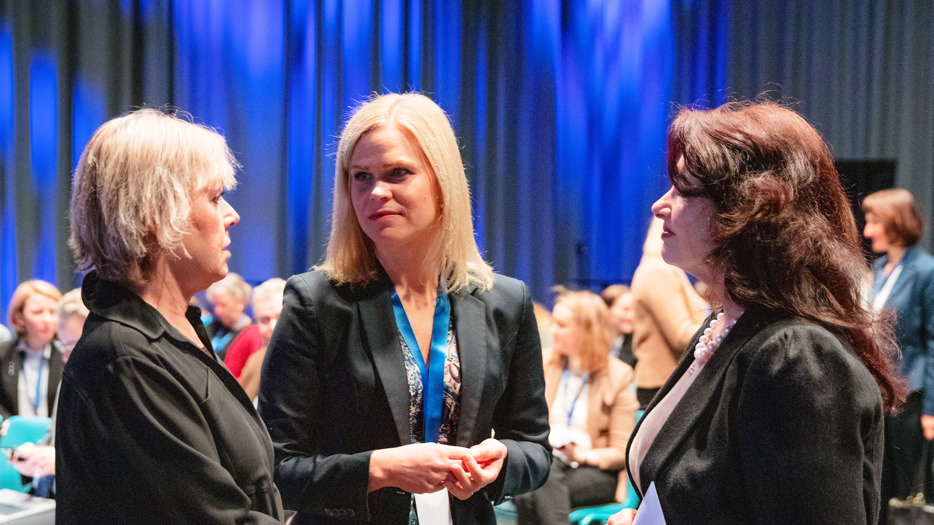Economic violence in focus when 25 countries meet in Stockholm
Sweden holds the presidency of the EU's Council of Ministers during the first half of 2023. As part of the leadership, the government, with the support of the Swedish Gender Equality Agency, organised a gender equality conference in early February, with a focus on economic violence.
Under the banner “Economic perspectives on gender-based violence – paving paths to prevention” equality experts from all over Europe shared each other's expertise and exchanged experiences from their respective countries.
Economic equality and combating men's violence against women are priority areas for gender equality both in Sweden and in the EU. However, they are not isolated islands but influence each other and at the intersection we find economic violence; a relatively unexplored area that is connected to other types of violence.
"Economic violence leaves many women dependent on their perpetrators – unable to leave or forcing them to return by depriving them of all means of self-support." - Lena Ag, Director General of the Swedish Gender Equality Agency, in her opening speech

Women's economic empowerment as a protective factor
Without a stable economy, it can be particularly difficult to leave an abusive relationship. Participants at the conference agreed that women's economic empowerment is a protective factor against economic violence.
The importance of helping women build their financial self-confidence, ensuring that they receive equal pay for equal work and counteracting the precarious position of women in the labour market were some examples of efforts that were mentioned. Employers and states play a critical role in promoting women's opportunity to live independent lives and not perpetuate policies that risk contributing to keeping vulnerable women in cycles of violence and that worsen their economic prospects.
Economic violence must be seen as violence
States need to include economic violence in the criminal code in order to have the tools to counter it, but also because it has a normative effect; if it is legal, it is likely that it will not be seen as violence and that people will take the behavior more lightly.
A recurring point during the conference was also the importance of spreading knowledge about economic violence so that vulnerable people can identify what is happening, which can make it easier to seek help. Dissemination of information can also contribute to employers and professionals treating the vulnerable in a better way and developing relevant support.
"Women's economic empowerment is essential for an equal society free from violence." - Berit Jernberg, head of the department of the National strategy for preventing and combating men's violence against women
Prevention as a guiding principle
Economic violence intertwines two major gender equality problems and requires a preventive approach. The ratification of the Istanbul Convention and ILO 190 were highlighted as examples of two important tools.
The Istanbul Convention is a European agreement on violence against women, which consists of four pillars, of which violence prevention is one. The convention also has a review body, GREVIO, which follows up the work of states and makes further recommendations. ILO 190 exists to protect workers, regardless of their employment status, from violence and harassment including gender-based discrimination in the workplace, and also ensures that awareness-raising campaigns against violence and harassment are in place.
An important part of the preventive work is to combat traditional gender norms that lead to men choosing to practice violence, but which also lead to segregated labor markets where female-dominated professions are valued lower. Stereotypes about men and women also result in women doing most of the unpaid domestic and care work, which among other things lead to much lower pensions for women, which increases their vulnerability at the final stage of life.
– Women's economic empowerment is crucial for a gender equal society free from violence. Where we find ourselves today, we need to increase knowledge and draw attention to women's economic vulnerability as an obvious part of men's violence against women, says Berit Jernberg, head of department of the National strategy for preventing and combating men's violence against women at the Swedish Gender Equality Agency.
What is economic violence?
“…behaviours that control a person’s ability to acquire, use, or maintain economic resources, thus threatening their economic security and potential for self-sufficiency.” Adams, Sullivan, Bybee and Greeson, 2008 cited in Understanding and responding to economic abuse, Sharp-Jeffs, N. 2022
Economic violence – what an abuser does:
Economic control – tracks and bars a woman’s access to resources and ability to use them
Employment sabotage – stops a woman from applying for or taking a job, curbs opportunities for career growth, harasses a woman at work
Economic exploitation – spends all funds, runs up debt, takes out loans in a woman’s name without her knowledge or through coercion – ‘sexually transmitted debt’ – and ruins a woman’s credit score
Publication date: 6 February 2023
Last updated: 11 June 2024
